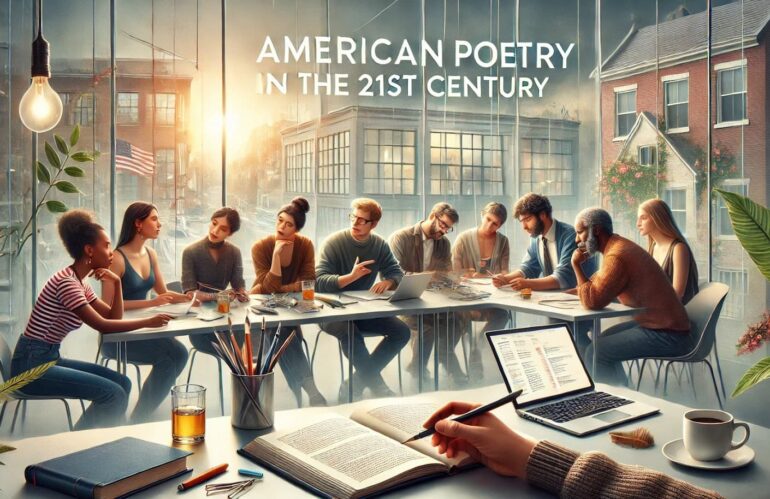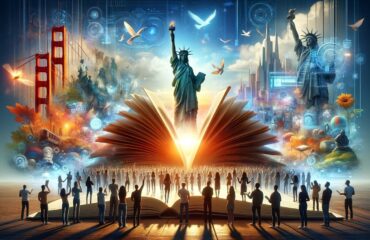American poetry in the 21st century reflects the dynamic and evolving nature of the nation’s culture, addressing a variety of complex issues with fresh perspectives and innovative styles. As the world becomes more interconnected through technology, the poetry landscape has undergone significant changes. Traditional forms and themes still hold their place, but contemporary poets are increasingly experimenting with new structures, languages, and modes of expression. The rise of digital platforms has democratized the distribution of poetry, allowing poets to reach global audiences and engage in real-time conversations. This era marks a departure from the rigid conventions of the past, embracing a more inclusive and diverse poetic voice.
Emerging voices in 21st-century American poetry often reflect the multicultural and intersectional nature of modern society. These poets tackle themes such as identity, race, gender, and social justice, offering rich, diverse perspectives that challenge readers to reconsider their assumptions. Poets today are more inclined to explore personal and collective narratives, addressing issues of systemic inequality, environmental crises, and cultural divisions. As a result, the 21st century has seen a flourishing of poetry that is not only an art form but also a vehicle for activism and change. This introduction to American poetry’s current landscape reveals a vibrant, multifaceted movement that continues to shape the future of literary expression.
Definition of Poetry
Poetry is a form of artistic expression that uses language creatively to evoke emotions, paint vivid imagery, and explore complex ideas. Unlike prose, which focuses on straightforward narrative and exposition, poetry emphasizes rhythm, sound, and structure to enhance its meaning. Through carefully chosen words, poetic devices such as metaphors, similes, alliteration, and rhyme help to create a deeper, often more emotional resonance. Poetry distills language, packing layers of significance into a few lines, offering multiple interpretations and a unique experience for each reader. Whether in structured forms like sonnets or free verse, poetry conveys emotions and truths that might be difficult to express in any other medium.
The beauty of poetry lies in its ability to capture the nuances of human experience, often using abstract and symbolic language to communicate what cannot always be said directly. It can explore themes of love, loss, identity, nature, and society, offering both personal reflection and universal insights. A poem’s form can range from tightly controlled to highly experimental, giving poets the freedom to innovate while maintaining a deep connection with language. Whether written for public performance, personal reflection, or artistic exploration, poetry serves as a mirror of culture and emotion, reflecting the world in its richest and most expressive form.
History of American Poetry
The history of American poetry spans from the 17th century to the present, evolving alongside the nation’s cultural, social, and political transformations. Rooted in European, especially British, traditions, early American poetry gradually developed its own voice through the Puritan writings of Anne Bradstreet. In the 19th century, Romanticism introduced a focus on individuality and emotion, with Walt Whitman and Emily Dickinson reshaping poetic expression. The 20th century witnessed major innovations, with modernist poets like T.S. Eliot and Ezra Pound broke with formal traditions, while movements such as the Harlem Renaissance and the Beat Generation gave voice to new cultural and political perspectives. Through each era, American poetry has expanded in form, theme, and diversity, reflecting the nation’s shifting identity.
| Period | Years | Key Features | Notable Poets |
| Puritan Era | 1600s – early 1700s | Devotional, moralistic poetry influenced by British tradition | Anne Bradstreet |
| Colonial & Revolutionary Period | 1700s | Patriotic themes, neoclassical influence, early national identity | Phillis Wheatley, Philip Freneau |
| Romanticism & Transcendentalism | Early to mid-1800s | Focus on nature, individuality, spirituality | Walt Whitman, Emily Dickinson, Ralph Waldo Emerson |
| Late 19th Century Realism & Naturalism | Late 1800s | Social realism, experimentation with form | Paul Laurence Dunbar, Stephen Crane |
| Modernism | 1910s – 1940s | Fragmentation, free verse, disillusionment post-WWI | T.S. Eliot, Ezra Pound, William Carlos Williams |
| Harlem Renaissance | 1920s – 1930s | Celebration of Black culture, resistance to racism | Langston Hughes, Claude McKay |
| Beat Generation | 1940s – 1960s | Rebellion, personal freedom, Eastern spirituality | Allen Ginsberg, Jack Kerouac |
| Confessional & Contemporary Poetry | 1950s – present | Personal themes, diverse voices, political engagement | Sylvia Plath, Maya Angelou, Louise Glück, Ocean Vuong |
American Poetry in the 21st Century
In the 21st century, American poetry has gained significant popularity, often transcending traditional literary circles to reach wider audiences through social media, performances, and digital platforms. Many poets have captured the public’s imagination by exploring contemporary issues, deeply personal experiences, and the ever-changing cultural landscape. Some of the most popular and influential works in recent years have tackled themes of identity, race, love, loss, and social justice, resonating with readers from diverse backgrounds. Here are a few standout examples of popular American poetry in the 21st century:
Citizen: An American Lyric by Claudia Rankine
Claudia Rankine’s Citizen is a powerful exploration of race, identity, and the systemic nature of racism in America. The book blends poetry, prose, and visual elements, making it a groundbreaking work that challenges conventional boundaries of form. Rankine’s keen observations on the microaggressions and overt racism experienced by Black individuals resonate strongly in today’s sociopolitical climate. Citizen has gained widespread acclaim for its thought-provoking approach to difficult topics, making it one of the most significant works of the 21st century.
Don’t Call Us Dead by Danez Smith
Danez Smith’s Don’t Call Us Dead is a collection that examines race, sexuality, and the experience of being Black and queer in America. Smith’s lyrical style is emotional, raw, and deeply personal, yet it speaks to the broader struggles of marginalized communities. The book delves into themes of violence, resilience, and identity, and it has garnered attention for its innovative use of language and its candid exploration of the Black queer experience. Smith’s work has made them one of the most exciting and influential poets of the 21st century.
Night Sky with Exit Wounds by Ocean Vuong
Ocean Vuong’s debut poetry collection, Night Sky with Exit Wounds, has received widespread praise for its lyrical beauty and emotional depth. The book covers themes such as immigration, loss, love, and identity, with Vuong’s distinctive voice offering insight into the immigrant experience, particularly that of the Vietnamese American community. Vuong’s delicate yet powerful imagery, combined with poignant reflections on war, memory, and family, has made this collection one of the most beloved poetry books of the century. Vuong’s ability to navigate complex emotions with tenderness has earned him a dedicated following.
The Tradition by Jericho Brown
Jericho Brown’s The Tradition won the Pulitzer Prize for Poetry in 2020, solidifying his place as one of the leading voices in contemporary American poetry. This collection touches on themes of love, masculinity, race, and the history of violence in America. Brown’s innovative use of form, particularly his creation of the “duplex” form (a type of poem that incorporates repeating lines), adds depth to his exploration of trauma and healing. The Tradition is celebrated for its emotional resonance and its profound exploration of both personal and societal issues.
The Carrying by Ada Limón
Ada Limón’s The Carrying was widely praised for its meditative and accessible poetry that explores themes of nature, loss, and the human condition. Limón’s poems often reflect on the intimacy of the everyday and the beauty found in ordinary experiences. Her clear, evocative language invites readers to reflect on life’s impermanence, the complexity of relationships, and the joy of connection. Limón’s work has made her one of the most popular and respected poets of the 21st century, with The Carrying gaining significant recognition for its vulnerability and insight.
Conclusion
American poetry in the 21st century stands as a vibrant and diverse field that reflects the complexities of modern life. Emerging voices have brought fresh perspectives, tackling issues of identity, race, gender, and social justice with innovation and emotional depth. These poets not only preserve the rich traditions of American poetry but also challenge and expand its boundaries through experimental forms, digital platforms, and performance poetry. The integration of technology, social media, and spoken word has made poetry more accessible and immediate, allowing poets to engage with a broader, global audience.





